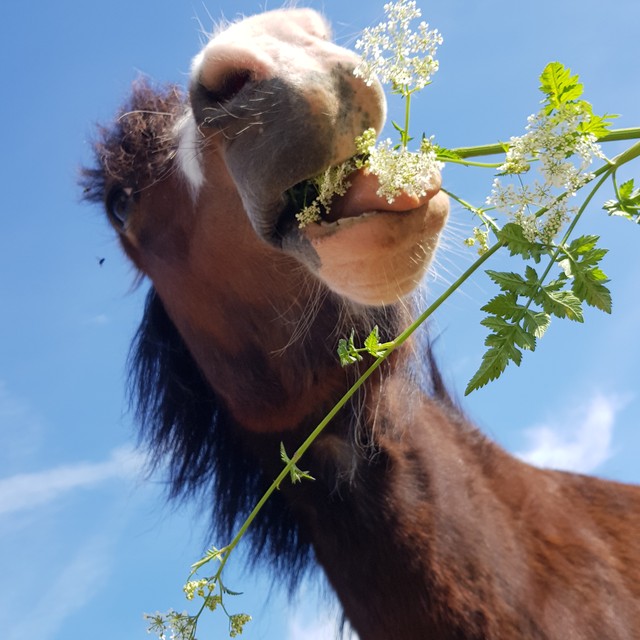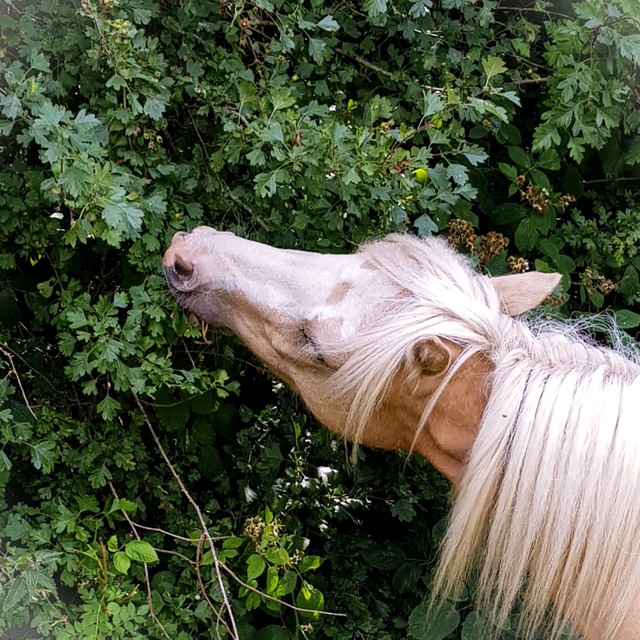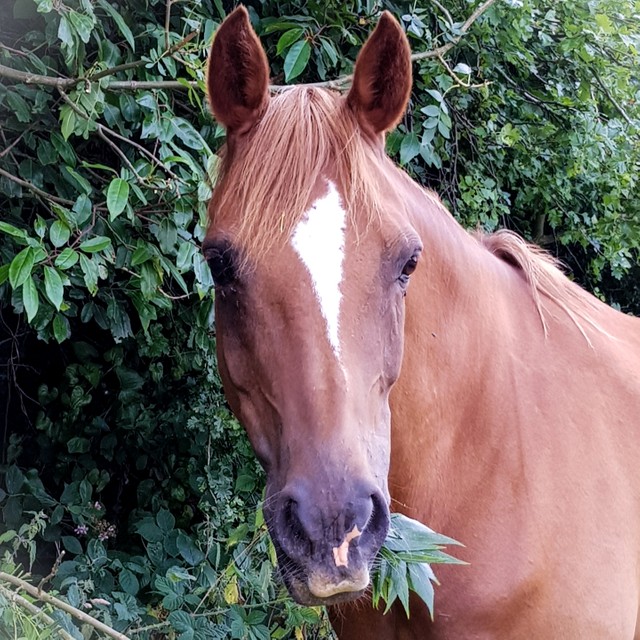acf domain was triggered too early. This is usually an indicator for some code in the plugin or theme running too early. Translations should be loaded at the init action or later. Please see Debugging in WordPress for more information. (This message was added in version 6.7.0.) in /var/www/horseshoehearts.co.uk/public/wp-includes/functions.php on line 6121Posted on 23rd April 2019

We just adore the lime green colours of Spring. After an Easter Bank Holiday Weekend full of fantastic sunny weather the apple trees are blossoming and buds are unfurling. This has to be our favourite time of year. Hedgerows buzzing with new life and stalks of cow parsley are beginning to line the verges.
are unfurling. This has to be our favourite time of year. Hedgerows buzzing with new life and stalks of cow parsley are beginning to line the verges.
I think these later Spring weeks are our favourite! A lot of horses, given the opportunity, love to forage and eat a variety of different plants alongside grass. Many of them containing different medicinal properties that horses may have an instinctive compulsion to eat for self medication.
We’ve four native ponies and two arabians. One of them an older mare who has cushings/PPID. On her diagnosis we did a lot of reading about feeding, forage and natural diets. We came across some surprising information at times and it is worth noting that some grasses, especially rye grass, is high sugar and not your equines best friend. Be on the lookout for it hiding in ‘repair’ seed mixes for paddocks and if you have natives or cushings ponies as we do, best avoid it. Perrenial rye grass is fabulous for rearing cattle on but definitely not good for horses!
Investigating some grass alternatives for our ponies proved great fun in offering them the taste tests! Here is a little run down of our ponies’ favourites that you may like to see if your four footed friends like too. If they don’t have access to forage through a hedgerow you could harvest a few bits for them and see which ones they prefer.
To be honest this one really is for spring. Ours adore the soft, lime greens stalks of fresh new growth. They will pick at it throughout the summer but tend to give it a miss into late summer and autumn. Hawthorn is the plant that they can’t get enough of early in the year and gives their breath a lovely, almost rhubarby scent. Hawthorn is said to improve blood circulation and can help with blood supply and healing to localised injury sites.
to give it a miss into late summer and autumn. Hawthorn is the plant that they can’t get enough of early in the year and gives their breath a lovely, almost rhubarby scent. Hawthorn is said to improve blood circulation and can help with blood supply and healing to localised injury sites.
Another springtime treat, which smells to me a lot like celery, is cow parsley. You know the one, it’s delicate white umbles line the verges in spring and every one of our ponies other than Fairy, adores it. It has properties that could aid digestion, similar to Fennel, and is a relative of Chervil, a cultivated herb that can be made up into infusions to help with stomach upsets. Chervil water is also used as an ingredient in gripe water. When picking cow parsley, be sure to do your homework and make sure it is definitely cow parsley you are picking and not Hemlock. Hemlock is poisonous. You may also want to avoid picking cow parsley from verges to try and avoid exhaust fumes.
We have heard it said that horses will eat Ash tree leaves if no other forage is available, but ours seem to love Ash leaves even when other food is plentiful. Ash was used as forage in Europe for cattle. Harvested, dried and fed over winter, but is not so often used as such in the UK. It has been noted that wild New Forest ponies become aware of Ash tree leaves falling will divert from their normal routes to eat the fallen leaves and return year after year remembering the locations.
used as forage in Europe for cattle. Harvested, dried and fed over winter, but is not so often used as such in the UK. It has been noted that wild New Forest ponies become aware of Ash tree leaves falling will divert from their normal routes to eat the fallen leaves and return year after year remembering the locations.
Hazel & Willow trees are both also safe for horses and ours enjoy nibbles on each on occasion!
Next is nettles! Does anyone not have nettles in their paddocks?! The good thing about pesky nettles is horses love dried nettles! All you need to do is swipe them down, a big stick will do, and over a couple of days horses will eat them. One of our ponies is super stoic and will even eat living nettles! Nettles are a fantastic source of iron as well as other minerals and support the immune, respiratory and reproductive systems.
Dandelions are also a horsey superfood rich in vitamin A, B, C and D and helps support liver function. Great for flushing out toxins and cleaning the system the dandelion really is a free and fantastic treat for horses.
As with gathering and feeding any food stuff, make sure you know your plants! Know you are feeding the right thing and avoid picking from areas where there is a risk the plants could have been sprayed with any chemicals.
risk the plants could have been sprayed with any chemicals.
You can gather for your horses as a free treat or take your horse out for a walk in hand and see what your horses chose to eat.
Horses do of course love grass but they are not just grazers, they are foragers and browsers too and having the opportunity to self select from various shrubs and trees is good for them physically as well as mentally.
We’d love to hear what other plants and trees are favourites with your four footed friends!
Subscribe to our newsletters now and stay up-to-date with new collections and exclusive offers.